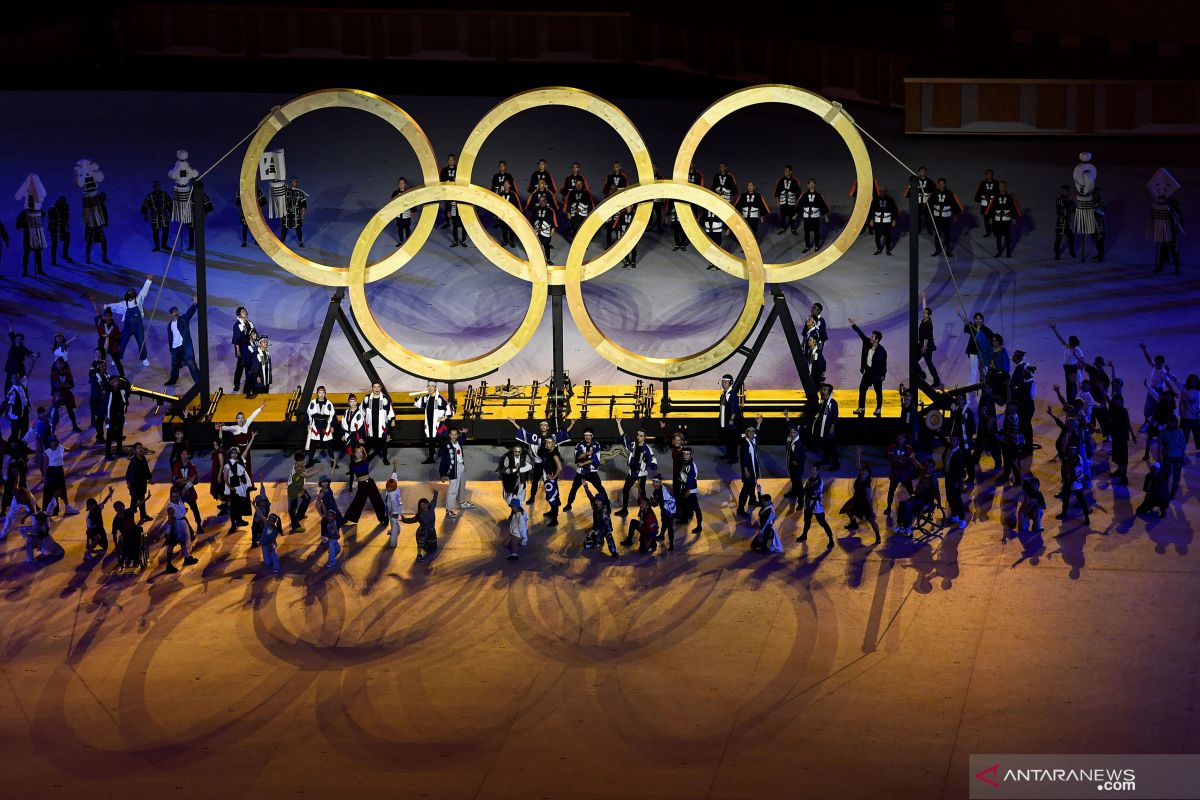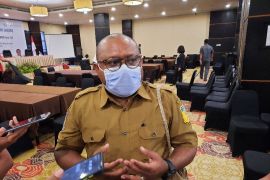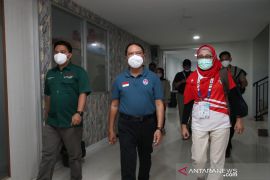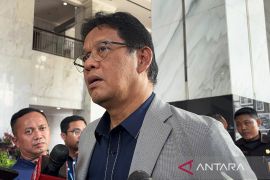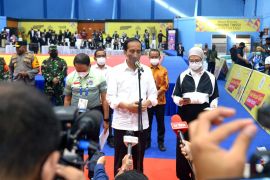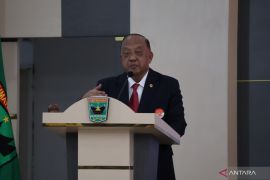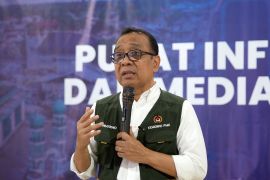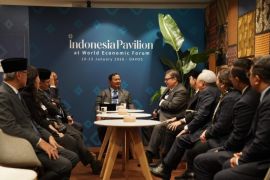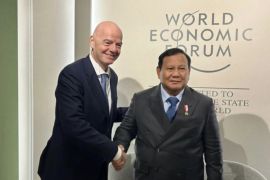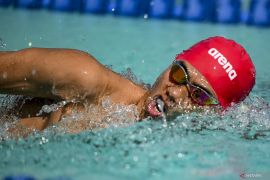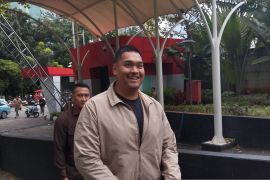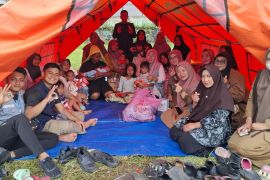Hospitals in Papua are full of COVID-19 patients, with several overloaded hospitals forced to rely on makeshift tents to admit more patientsJakarta (ANTARA) - Despite pressures from various public organisations to cancel the 2020 Summer Olympics in Tokyo, Japan, scheduled for July 2021 after being pushed back by a year, the opening ceremony was held on July 23, 2021. Amidst the encroaching pandemic, the Olympics has proceeded smoothly and no large-scale outbreak has occurred within the event, a miracle indeed.
According to the official report, around 353 positive cases have been recorded among the Olympics participants from July 1 to August 5. The 353 positive cases consisted of 29 athletes, 98 match officials, 17 journalists, six Olympics employees, 188 contractor staff, and 15 volunteers. No deaths have been recorded as all patients received quick and proper treatment.
As of August 3, 2021, the COVID-19 positive cases are small in number as against the total of around 42,345 participants, including coaches, officials, and other supporting individuals, with athletes making up 11,000 of that total.
With these numbers, how did Japan successfully achieve this feat? The answer is the enforcement of strict health protocols in all aspects of the event.
ANTARA photographer Sigid Kurniawan experienced first-hand the complicated procedures he had to undergo during his stay to cover the 2020 Olympics for the Indonesian news agency.
Earlier, the Japanese authority had notified all prospective guests, including athletes, officials, journalists, and other participants, about all procedures necessary before and during their visit to Japan for the Olympics.
For Indonesian guests such as Kurniawan, the authority required him to undergo two weeks quarantine before departure, with PCR tests conducted daily on the second week. He was allowed to depart for Japan only after the test results showed negative results for seven consecutive days.
Olympics participants, including journalists, had to spend another three days in quarantine at a designated hotel upon arrival in Japan. Quarantined participants were administered daily saliva-based PCR tests during their stay, and were prohibited from changing rooms or being away from it.
Once their COVID-19 tests were diagnosed as negative during their stay, the quarantine was over, and they were allowed to leave the quarantine hotel.
Despite no longer being in quarantine, the Olympians face access restrictions during their stay until their departure back to their home country.
Athletes have access only to the athletes' village and the match venue, while journalists are allowed access only to their hotels, the media information centre, and the match venue. Moving around is also restricted, with free buses provided by the committee the only available transportation mode for those who want to navigate.
"The bus arrives every 30 to 40 minutes on a fixed schedule. For this reason, we are prohibited from changing hotels," Kurniawan remarked.
Strict health protocols are observed in all Olympic-related locations, places, and rooms. At the media centre, journalists are obliged to follow health protocols by washing hands, undergoing temperature checks and examinations by the security personnel before being allowed entry.
Inside the media rooms, each table is separated by a plastic partition to discourage interaction among journalists.
Athletes, journalists, and other Olympics participants are obliged to undergo saliva-based PCR tests every day. The PCR test is complimentary from the Olympics committee.
All participants are also obliged to download a mobile application called "Online Check-in and Health Report" (OCHA) and fill the daily health report form on the application. The app will send a direct warning to the email for those who forget to fill in the daily health report.
The COVID-19 pandemic forced the Olympics committee to rack its brains to adopt new procedures and ensuring all Olympic venues were safe from the virus.
Due to the health protocol in place, table tennis players are prohibited from blowing on the ball before the game, and badminton players must retrieve the shuttlecocks on their own.
For weightlifting, barbells are thoroughly disinfected after each athlete completes his or her routine, and the same procedure is followed in the boxing rings. Television audiences worldwide will also have watched victorious athletes drape their medals themselves during the medal ceremony, without any handshakes.
Although one might perceive these procedures as too strict, it is undeniable that the strict enforcement of health protocols is the reason why the 2020 Summer Olympics have been safe from the COVID-19 pandemic rampant outside the Olympics venue. One hundred percent of the health protocols planned by the committee were implemented in their entirety.
Related news: Vaccinations expedited ahead of 20th PON
Related news: KONI completes first phase of vaccination of Papua PON athletes
How about our PON?
While Tokyo hosted the 2020 Summer Olympics, Indonesia's Papua Province will host the 20th National Sports Week (PON) from October 2 to 15, 2021. The sports venues are scattered in Jayapura City, Jayapura District, Mimika District, and Merauke District.
Our question is the same: Can we bring home the same success of the 2020 Summer Olympics that is keeping the COVID-19 outbreak at bay?
The Health Ministry, on June 2021, announced a special medical team and health protocol guideline dedicated to the Papua PON. The guidelines dictate the obligation for the athletes and officials to be vaccinated and undergo a COVID-19 antigen swab test before their participation in the competition; quarantine is not required as per the guidelines.
Unfortunately, the recent outbreak of the Delta variant of the SARS-CoV-2 has forced the government to press the emergency brake and implement large-scale activities restrictions (PPKM) in multiple cities and districts.
With the country on a COVID-19 alert, the confidence for a safe PON is now in doubt.
Papua PON Preparation Committee Head Yunus Wonda recently requested technical guidance from the central government on the health protocols for the PON event.
More than 6,000 athletes from all provinces would gather in Papua and in the pandemic situation, it is a recipe for disaster, Wonda stated.
"Hospitals in Papua are full of COVID-19 patients, with several overloaded hospitals forced to rely on makeshift tents to admit more patients. We are asking the central government for guidance to prevent another outbreak at the PON venue," Wonda said.
The committee also requested the government's assistance to educate the public on the COVID-19 pandemic. Knowledge of the pandemic and the health protocol is essential to assure public compliance to the enforced health protocol, similar to how Japanese residents are complying with the health protocol during the Olympics.
There are still two months left for the opening ceremony of the PON. All parties should collaborate and cooperate more. While infrastructure and supporting facilities are essential, people’s health must come first.
Japan has shown how they have successfully conducted a large-scale sporting event involving worldwide athletes. No outbreak within the Olympic venues occurred despite the pandemic.
Indonesia can follow Japan's success, but we need only to abide by two simple conditions: consistent enforcement and discipline to adhere to the enforced health protocol.
It is simple yet essential to ensure our success to hold the Games amidst the pandemic. (INE)
Related news: Merauke presses ahead with PON preparations amid COVID surge
Related news: PON Papua, an amalgamation of natural beauty and sportsmanship
Translator: Michael Teguh AS, Nabil Ihsan
Editor: Yuni Arisandy Sinaga
Copyright © ANTARA 2021
